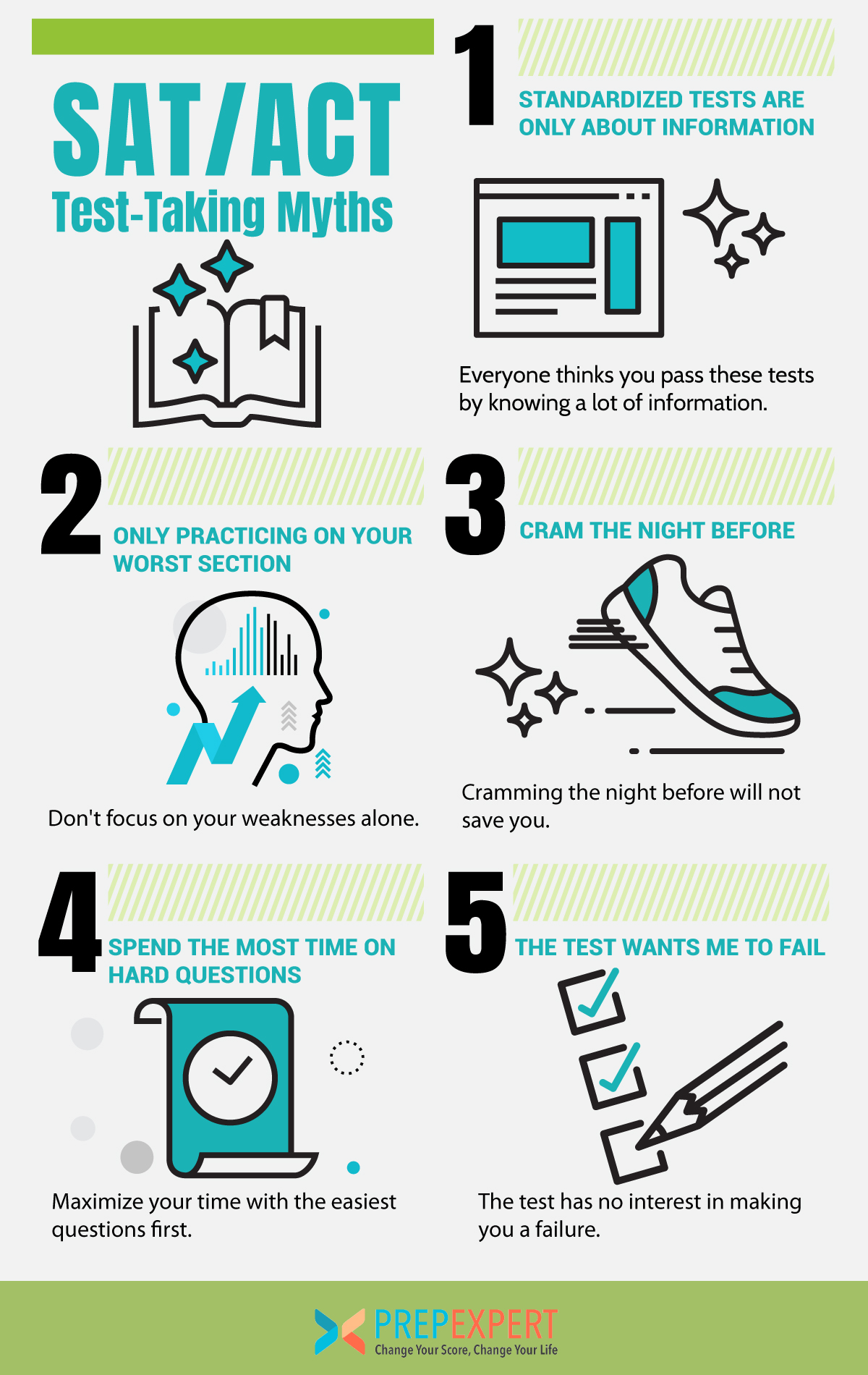SAT/ACT Test-Taking Myths
When it comes to standardized tests, there are common test-taking myths that students often mistakenly believe as fact and they screw up their test preparation. Thankfully, if you know them ahead of time, you can avoid their negative consequences altogether.
It doesn’t matter whether you’re taking the SAT or ACT, there are common test-taking myths that every student should know, so it doesn’t screw up your studying.
Learn how to prepare for standardized tests with our year-round SAT prep and ACT prep courses today.
Standardized Tests Are Only About Information
Everyone thinks you pass these tests by knowing a lot of information.
You don’t pass them by knowing everything. You pass standardized tests, by understanding how to take the test itself.
It’s the test-taking skills you develop that make the difference. Why? Because the test writers know that not all school curriculums are the same. Because of that fact, they have to write questions that anyone can reasonably answer with previously-taught information.
That’s why you’ll receive readings, prompts, and other pertinent information in questions. You have everything you need to answer, but knowing how to find the answer is the trick.
Only Practicing On Your Worst Section
Don’t focus on your weaknesses alone.
The common-sense approach to studying is focusing on your worst subject the most. Unfortunately, this tactic can screw up your final score.
How? By allowing you to get lazy on your best subjects, you’ll miss easy points. Because all test sections are averaged together, they all have equal weight. You need to reinforce your strong subjects while improving on your weak ones.
On test day, you should be able to handle all of them without a problem. Otherwise, your total score will suffer from simple mistakes made by being overconfident.
Cram The Night Before
Cramming the night before will not save you.
Again, your test performance is based on your skill level, not intelligence level. Trying to force extra information in your brain at the expense of physical rest will hurt you.
By sacrificing sleep, your body will:
- Lose physical energy
- Create stress and disorientation
- Be unable to answer anything correctly
Instead, focus on getting a solid eight hours of sleep. That way, even if you’re stumped on a question, you’ll be able to move forward and tackle what you can answer easier and quicker. At that point, go back and handle the harder questions.
Spend The Most Time On Hard Questions
Maximize your time with the easiest questions first.
It’s natural that some questions will be harder on a given section than others. If there are one or two questions that stump you, simply move onto the ones you can easily answer first.
Why? Because you have a better chance of maximizing your correct point total in less time. Finish everything else that’s easier first and then go back to the harder questions.
Even if you have to guess, that’s ok. A couple of wrong guesses is better than an entire section of unanswered easy questions.
The Test Wants Me To Fail
The test has no interest in making you a failure.
Many students feel like standardized tests are out to get them. The fact is these tests are designed to make you fail them.
They’re designed to measure what you already know and how you comprehend information plus problem-solving. They aren’t designed to hide any facts or information from you.
Remember that all the information you need to correctly answer is in front of you. Your test-taking skills will determine how to find that correct answer.
For more test strategy, college admissions, and scholarship application tips sign up for our FREE class happening right now!
Test-Taking Myths FAQ
What’s the biggest myth behind passing the SAT and ACT?
Everyone thinks you pass these tests by knowing a lot of information. You don’t pass them by knowing everything. You pass standardized tests, by understanding how to take the test itself. It’s the test-taking skills you develop that make the difference.
Should I only work on my weak areas?
The common-sense approach to studying is focusing on your worst subject the most. Unfortunately, this tactic can screw up your final score. How? By allowing you to get lazy on your best subjects, you’ll miss easy points. Because all test sections are averaged together, they all have equal weight. You need to reinforce your strong subjects while improving on your weak ones.
Should you cram for the SAT or ACT?
Cramming the night before will not save you. Instead, focus on getting a solid eight hours of sleep. That way, even if you’re stumped on a question, you’ll be able to move forward and tackle what you can answer easier and quicker. At that point, go back and handle the harder questions.
What’s another common myth about these tests?
Spending The Most Time On Hard Questions. Maximize your time with the easiest questions first. Why? Because you have a better chance of maximizing your correct point total in less time. Finish everything else that’s easier first and then go back to the harder questions.
